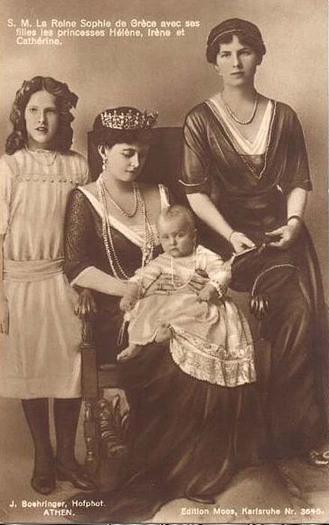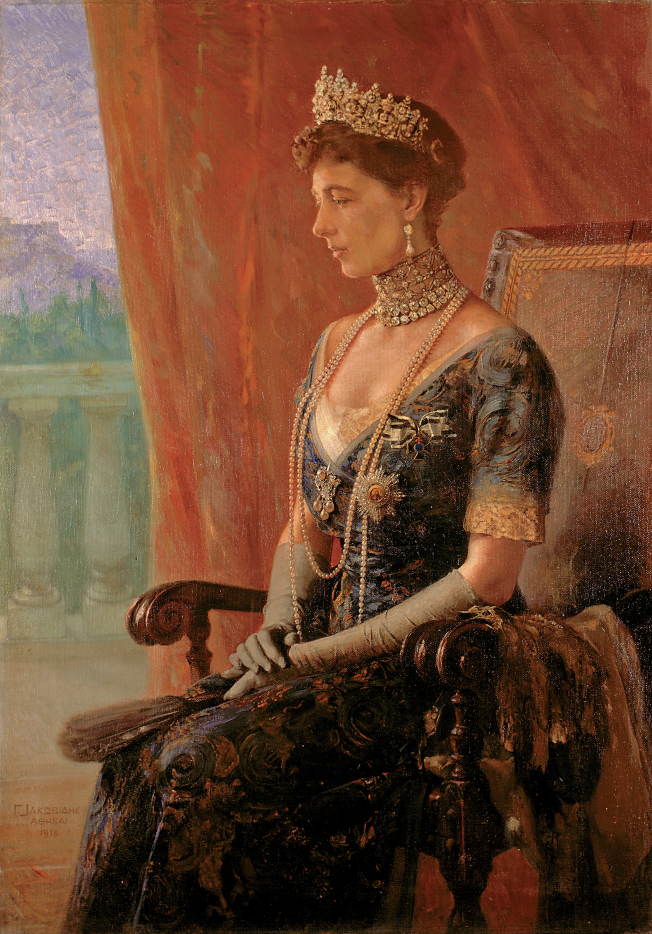One of the most common names in royal Europe today is Sophia. In Britain, the Queen's daughter-in-law is Sophie Countess of Wessex. In Sweden, the King has a daughter-in-law called Princess Sofia. Liechtenstein's Hereditary Princess is Sophie and Sophie is also the name of the wife of the current head of the German imperial House of Hohenzollern. In Spain the Queen Emerita is Sofia and so is her youngest grandchild, the Infanta Sofia. We can trace these two Spanish Sofias' common name back to a German princess who died January 13, 1932, or 85 years ago today.
 |
Sophie (seated in the center of the group) with her family
via Wikimedia Commons |
Sophie of Prussia was the third of four daughters of the enlightened Victoria Princess Royal of Britain and Emperor Friedrich III of Germany. Vicky, as her mother was known, was the eldest child of Queen Victoria and Prince Albert, who considered her more intelligent than her siblings. Both of Vicky's parents had been disappointed when she chose to marry young and move to Germany, but were delighted that it, like theirs, was a love match. Vicky's first years in her husband's country were frustrating because of her domineering mother-in-law who more or less seized control over Vicky's oldest children. However, Vicky had much more authority and better relationships with her younger offspring, including Sophie.This meant that Sophie had a mostly "British" upbringing and was closer to her British family than to her German one, including her much older oldest brother, the future Kaiser Wilhelm.
Sophie grew up with English nurses and taking holidays on the Isle of Wight amidst a vast array of cousins. However, her childhood was not all sunshine. When she was only 8, her cousin Mary of Hesse and her aunt Alice died from diptheria. (You can read my post about that,
The Kiss of Death.) A few months later, her nearest brother Waldemar contracted the same disease and died at age 11. A couple of years later, her dear sister Viktoria was prevented from marrying the man she loved for political reasons, although Vicky and Friedrich had approved of the match. It was a precursor of what Sophie would face.
 |
Sophie and Constantine
By Wilhelm Hoofers via Wikimedia Commons |
Perhaps it did not help that Sophie's love was encouraged by her English grandmother, who really had very little say in the marriage of German princess. More significantly, Sophie's father had died of throat cancer a day after her 18th birthday, leaving her oldest brother, Kaiser Wilhelm at the head of the government. Willy, as he was called, did not approve of Sophie's choice, the heir to the still-new throne of Greece. Not only did the Greek royal family derive from the Danish one, to which the Prussians were hostile, but they had adopted Orthodoxy as their religion. Willy would not allow his sister to leave her Protestant faith and, I think, he may have enjoyed flexing his muscles as the new emperor and head of the family. To make matter worse, Crown Prince Constantine's mother, who was Russian by birth, wasn't thrilled with the prospect of a Lutheran daughter-in-law either. Politically, Greece was more aligned with France and Britain, while German was making its bed with the Ottoman Turks, Greece's traditional enemies. Hardly anyone was happy about the union. Nevertheless, Sophie won her prince and they married in two separate religious ceremonies after a year of maneuvering. The bride was 19 and the groom was 21. They would have six children, with all three of their sons eventually becoming King of Greece.
Sophie maintained a close relationship with her mother. Their correspondence was as voluminous as Vicky's was with her own mother Queen Victoria. Sophie had also inherited a lot of Vicky's spunk; she was never a shrinking violet although she did her best to do her duty. The marriage was initially very popular among the Greek people, especially after Sophie decided to convert to Orthodoxy after all. This severely angered her brother, who even banned her from visiting Germany for a time. Despite the bad blood between them, however, Sophie's German roots would come to haunt her.
Greece never had a stable monarchy. After the Greeks lost the Thirty Days War against the Ottomans in 1897, some felt she had sided against her adopted country in favor of her homeland, the Turks' ally. Her husband even came close to being tried in a military court for his role in the defeat and her father-in-law, King George I of Greece, was nearly assassinated. So, the couple decided to leave Greece and were welcomed back to Germany by Kaiser Wilhelm. Constantine undertook more military training, but German training could hardly erase the political smear left on him by the war.
 |
Sophie with her daughters Irene,
Helen and Katherine
By RealPolitik via Wikimedia Commons |
Tensions and violence between Greece and the Ottomans continued, even after Sophie and Constantine returned. A decade later, all of the Greek princes were forced to resign their military commissions and a military government took over. The king was able to call for elections and new civilian government was elected, which restored the royal family, some of whom were in exile. Then the country was shaken by the Balkan Wars that preceded World War I. Between the First and Second Balkan Wars, in 1913, King George was assassinated, bringing Sophie and Constantine to the throne through violence. When World War I broke out, the royal couple wanted to keep Greece out of it, not just because they had close family relations on both sides but because Greece was already so weak from so many wars. The Greeks did not agree. The politicians and the king were at odds. When King Constantine was suddenly taken ill, a rumor spread that he was actually near death because the evil German Queen Sophie had stabbed him herself. The complexities of Balkan politics made it difficult to choose sides but the king's wavering led the French and their allies to determine that the Greeks were their enemies.
This led to greater danger for Sophie and Constantine, who had recovered from his illness. When a fire broke out on the royal grounds, many believed it had been assassination attempt. (You can read my post about Sophie's escape,
Fire at the Palace.) Even though Constantine reluctantly allowed the French to come to Greece to claim guns and soldiers, the French bombarded the palace causing Sophie and the royal children to take refuge in the cellars. By summer 1917, Constantine was forced to relinquish his powers to his second son, Alexander, while he and Sophie went into exile in Switzerland. Alexander's death from an infected monkey bite in 1920 caused a constitutional crisis. Their third son refused to take the throne over his still-living father and oldest brother. Eventually, Constantine was invited back.
 |
| By Georgics Jakobides via Wikimedia Commons |
However, all was still not well in Greece. Another war broke out with the Turks and Constantine was eventually forced to abdicate and return to exile. He died soon thereafter and Greece was declared a republic. Sophie never accepted that the republic would be permanent. She spent her last years trying to hold her family together and visiting with relatives. Three years after her death from cancer in 1932, her oldest son George was welcomed back to Greece as the new King. He was eventually succeeded by her third son Paul.
It is through King Paul that the name Sophie has been passed down to today. He named his oldest daughter Sophia. She was born nearly seven years after her grandmother's death. While the new Sophia of Greece's brother Constantine II would become the last king of Greece (he has been in exile now for more than 50 years), this Sophia would marry the heir to another deposed throne, whose return as the monarch King Juan Carlos actually brought democracy instead of dictatorship to Spain. Now known as Queen Sofia of Spain, she was honored with the passing of the name to her own granddaughter, Infanta Sofia in 2007. So, our Sophie's granddaughter and her granddaughter's granddaughter will carry the name forward well into this century and perhaps the next.
TODAY'S ROYAL SOPHIEs




No comments:
Post a Comment